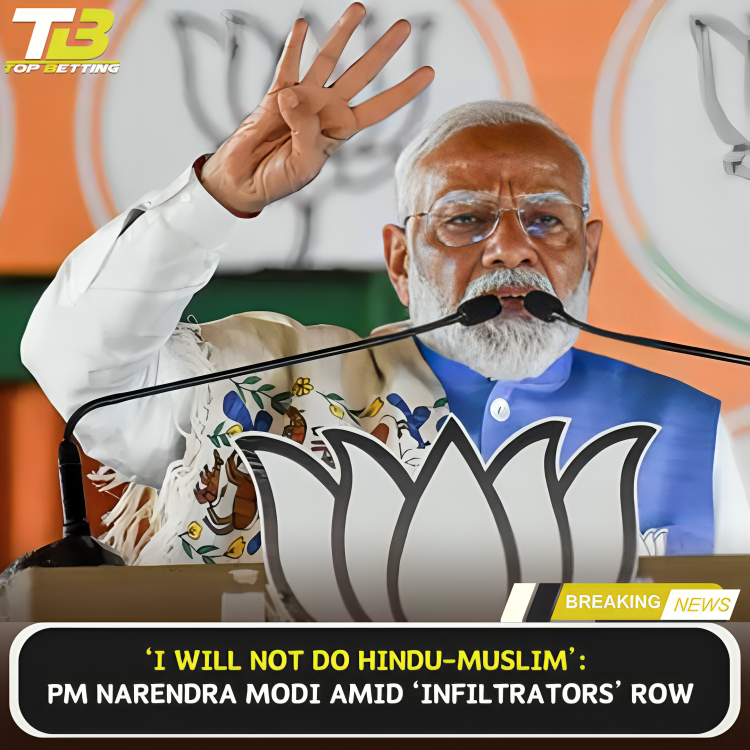
I will not do Hindu Muslim PM Modi
Context of the statement by PM Narendra Modi
In a country known for its diverse religious and cultural fabric, the issue of religious harmony has always held great importance. Recently, Prime Minister Narendra Modi made a resolute statement that has garnered significant attention and sparked a nationwide conversation. Amid the ongoing controversy surrounding the National Register of Citizens (NRC) and the Citizenship Amendment Act (CAA), PM Modi firmly declared, “I will not do Hindu-Muslim.” These words come at a time when the public is closely watching the government’s response to the protests and concerns raised by citizens across the country.
Understanding the ‘infiltrators’ row
The ‘infiltrators’ row refers to the contentious debate surrounding the NRC and CAA. The NRC, aimed at identifying illegal immigrants, has been a subject of intense scrutiny and debate since its implementation. The CAA, on the other hand, provides a pathway to Indian citizenship for persecuted religious minorities from neighboring countries. However, critics argue that the CAA excludes certain communities and goes against the principles of religious equality enshrined in the Indian constitution. These issues have ignited protests and raised concerns about the alleged targeting of minority communities.
Importance of religious harmony in India
India is a country renowned for its rich religious diversity, with Hindus, Muslims, Sikhs, Christians, and many other faiths coexisting for centuries. The concept of religious harmony is deeply rooted in the country’s ethos and has been a fundamental pillar of its secular fabric. The unity of diverse religious communities has contributed to India’s cultural richness and has been a driving force behind its progress. Any attempts to disrupt this harmony can have far-reaching implications for the nation’s social fabric and overall development.
Impact of divisive politics on society
Divisive politics, particularly along religious lines, can have detrimental effects on society. It can foster animosity, breed suspicion, and create a sense of otherness among different religious communities. Such divisions can lead to social unrest, hinder economic growth, and erode the trust between citizens and the government. Recognizing the negative impact of divisive politics, leaders have a responsibility to promote inclusivity and bridge the gaps between communities.
PM Modi’s stance on Hindu-Muslim unity
Prime Minister Narendra Modi’s resolute statement, “I will not do Hindu-Muslim,” carries immense significance in today’s highly polarized political landscape. By distancing himself from any notion of discrimination based on religion, PM Modi seems determined to quell tensions and maintain a united India. His assertion underscores the importance of inclusivity and highlights his commitment to representing all citizens, regardless of their faith. In a country where religion plays a significant role in public discourse, PM Modi’s stance can have a profound impact on shaping public opinion and fostering a sense of unity.
Reactions to PM Modi’s statement
PM Modi’s statement has elicited mixed reactions from various segments of society. Supporters view it as a powerful message of inclusivity and a reaffirmation of the government’s commitment to secular values. They believe that it will help address concerns about the alleged targeting of minority communities and promote a sense of unity among citizens. However, critics remain skeptical and question the government’s actions in relation to the NRC and CAA. They argue that PM Modi’s statement needs to be backed by concrete actions to alleviate the fears of marginalized communities.
Public opinion on the ‘infiltrators’ issue
Public opinion on the ‘infiltrators’ issue is varied and complex. While some people support the government’s efforts to identify and deport illegal immigrants, others express concerns about the potential exclusion and marginalization of certain communities. The issue has sparked debates on the balance between national security and human rights, with people advocating for a comprehensive and inclusive approach to address the challenges posed by illegal immigration.
Government policies and initiatives promoting religious harmony
The Indian government has implemented various policies and initiatives to promote religious harmony and unity. Programs such as the Interfaith Dialogue Forum have facilitated constructive discussions among religious leaders to foster mutual understanding and respect. Additionally, initiatives like the National Integration Council work towards ensuring equal opportunities and rights for all citizens, regardless of their religion. These efforts demonstrate the government’s commitment to upholding the principles of religious equality and fostering an inclusive society.
Role of leaders in fostering unity among diverse communities
Leaders, especially political leaders, play a crucial role in fostering unity among diverse communities. They have the power to shape public opinion, influence policies, and set an example through their actions. By promoting inclusive politics, encouraging dialogue, and addressing the concerns of all communities, leaders can bridge the gaps and create an environment where religious harmony can thrive. It is essential for leaders to lead by example and prioritize the welfare and unity of the entire nation.
Conclusion: The need for inclusive politics and religious tolerance

Prime Minister Narendra Modi’s bold statement, “I will not do Hindu-Muslim,” highlights the significance of inclusive politics and religious tolerance in a diverse nation like India. It serves as a reminder of the government’s responsibility to uphold the principles of equality and unity. In a society that is grappling with religious tensions and polarization, the need for leaders who prioritize inclusivity and bridge the gaps between communities has never been more crucial. It is only through inclusive politics and religious tolerance that India can truly flourish as a united and harmonious nation.











